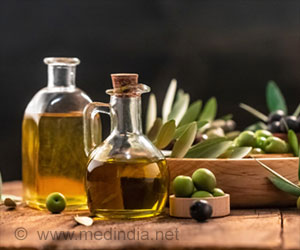Endometriosis, a condition characterized by pelvic pain, menstrual cramps and infertility. Endometriosis develops when tissue like the lining on the inside of the womb grows outside of the uterus, which may swell and bleed, leading to pain and other symptoms. In a recent study, olive leaf extract known as oleuropein has shown to suppress endometriosis progression and improve the fertility of mice with endometriosis (
).
Endometriosis depends on estrogen, a hormone well known for regulating a woman’s reproductive functions. Estrogen also affects other organs such as the heart and blood vessels, bones, breasts, skin, hair, mucous membranes, pelvic muscles and the brain.
Endometriosis’ dependence on estrogen and inflammation has guided treatments that are based on systematically removing estrogen and using anti-inflammatory drugs. However, current endometriosis treatments have low efficacy, high recurrence rate and cause adverse effects in other tissues affected by estrogen.
Advertisement
Since endometriosis is an estrogen-dependent disease, estrogen receptors (ERs) ER-alpha and ER-beta, which mediate the hormones’ effects on cells, play essential roles in the development and progression of the condition. These findings suggest that selectively suppressing the activity of ER-beta could help treat the condition without side effects of current hormonal therapies targeting ER-alpha.
Olive Leaves as Treatment for Endometriosis
The researchers found that oleuropein, a natural component found in olive leaves, selectively inhibits ER-beta activity, but not ER-alpha activity, and effectively suppresses the growth of mouse and human endometriosis lesions in mouse models. In addition, oleuropein treatment was neither toxic to the liver nor did it affect the ability of female mice to have offspring. In mice with endometriosis, oleuropein improved the pregnancy rate.
Natural products have been widely and globally used in various preventive and therapeutic health care formats. Unlike synthetic compounds, natural products are generated by enzymatic interactions. The biological activity of natural products involves protein‒protein binding, making them more effective drug candidates. In addition, natural products are a product of evolutionary pressure that results in their novelty. Natural products are more prone to bioactivity than synthetic compounds. For example, 48.6% of cancer drugs have natural origins or are derived from natural products. Therefore, natural products could also be employed to treat endometriosis as non hormonal therapies (2✔ ✔Trusted Source
Natural Products: Source of Potential Drugs
Go to source).
In addition, olive leaf extracts have various beneficial effects on human health, such as antimicrobial, antiviral, antioxidant, anti-inflammatory, anti aging-associated neurodegeneration, and anticancer effects.
It is metabolized in vivo into elenolic acid and hydroxytyrosol by beta-glucosidase and esterase activity in humans and mice. Hydroxytyrosol is also one of the major components in olive leaf extracts and has antiproliferative, antioxidant, and anti-inflammatory effects on various human cancers.
These promising findings support further exploration of the value of oleuropein as naturopathy for human endometriosis treatment. Oleuropein is less expensive than hormonal therapy, and the current findings suggest that it is safer than current treatments.
References :
- Oleuropein suppresses endometriosis progression and improves the fertility of mice with endometriosis – (https://jbiomedsci.biomedcentral.com/articles/10.1186/s12929-022-00883-2)
- Natural Products: Source of Potential Drugs – (https://idosi.org/ajbas/ajbas6(6)14/3.pdf)
Source: Medindia



